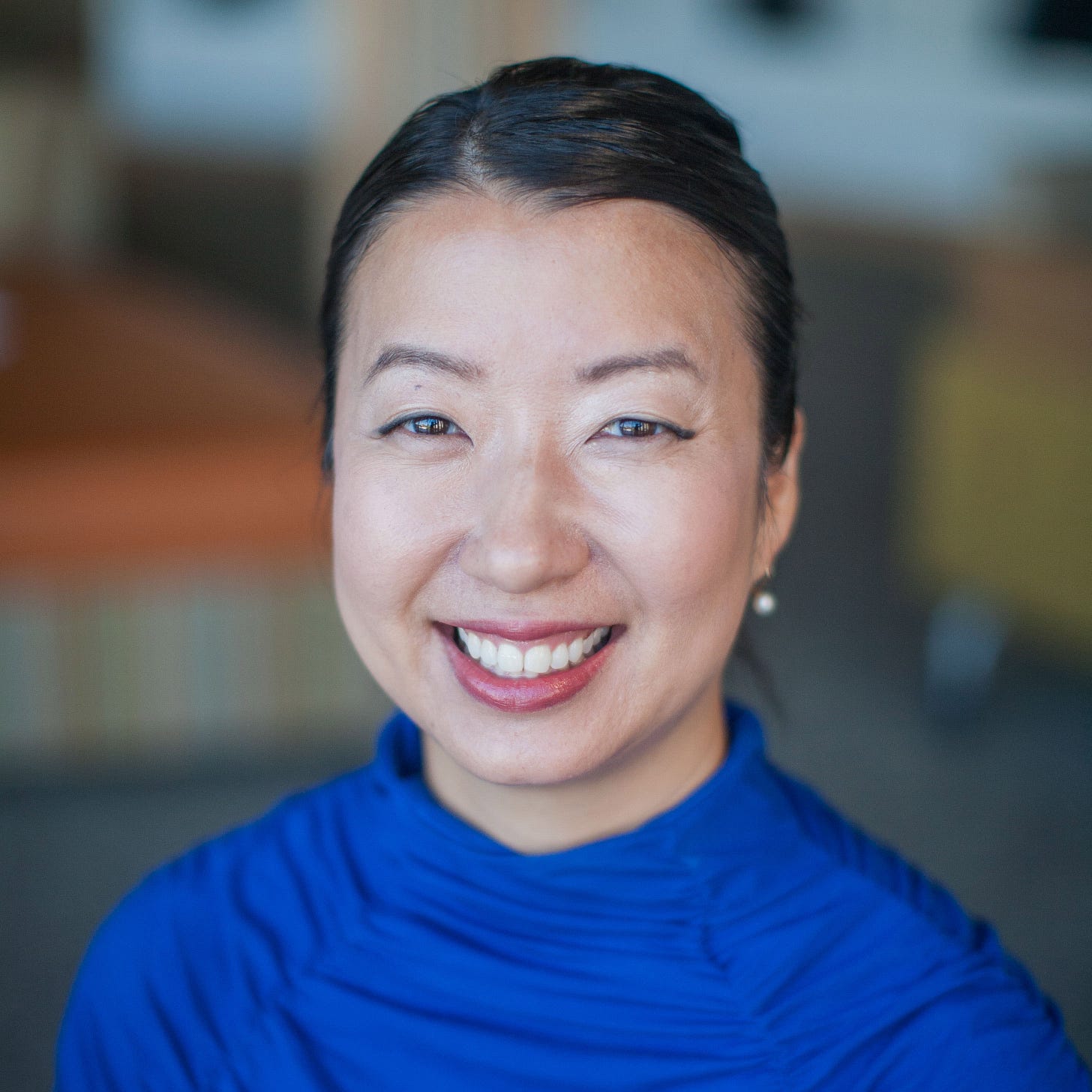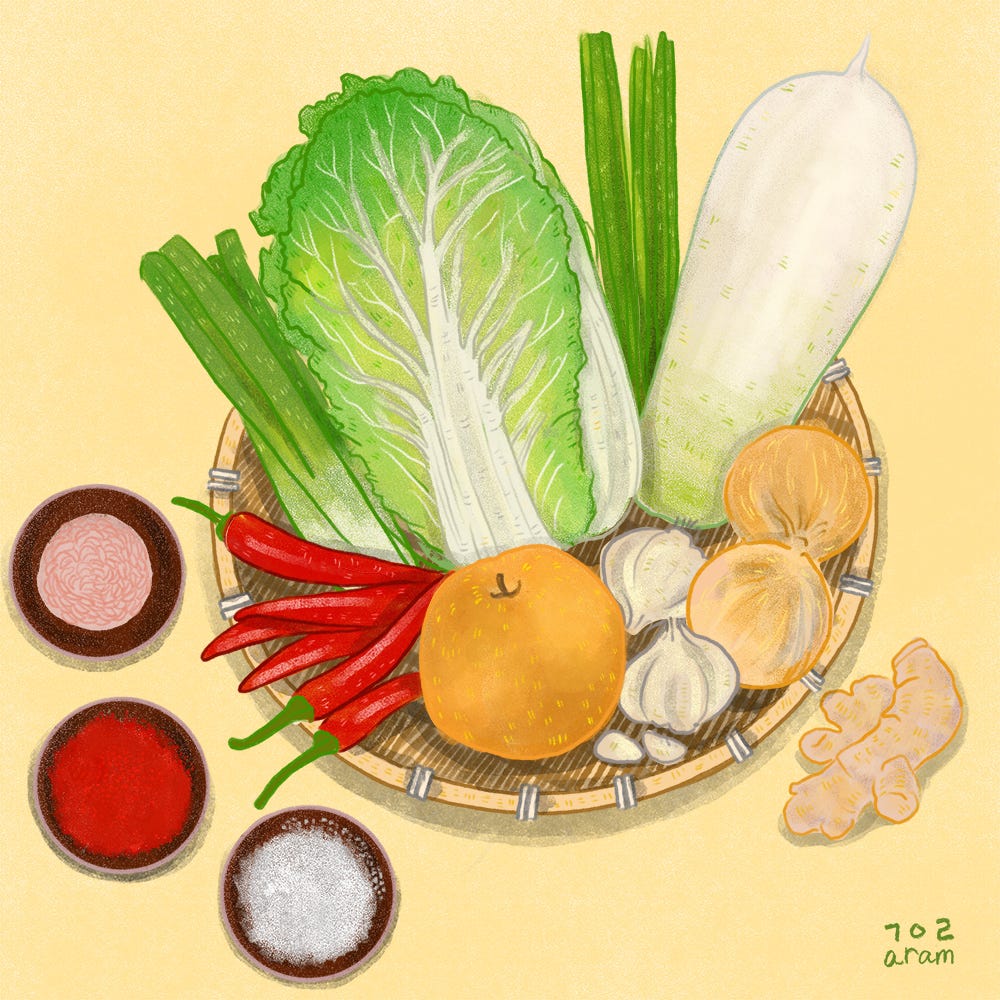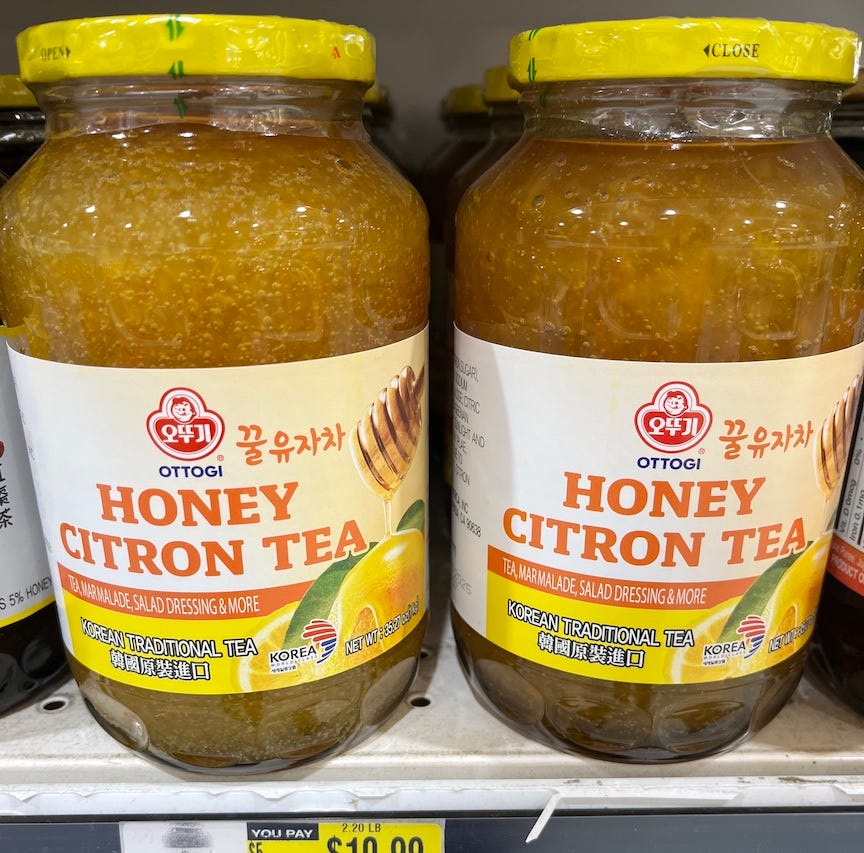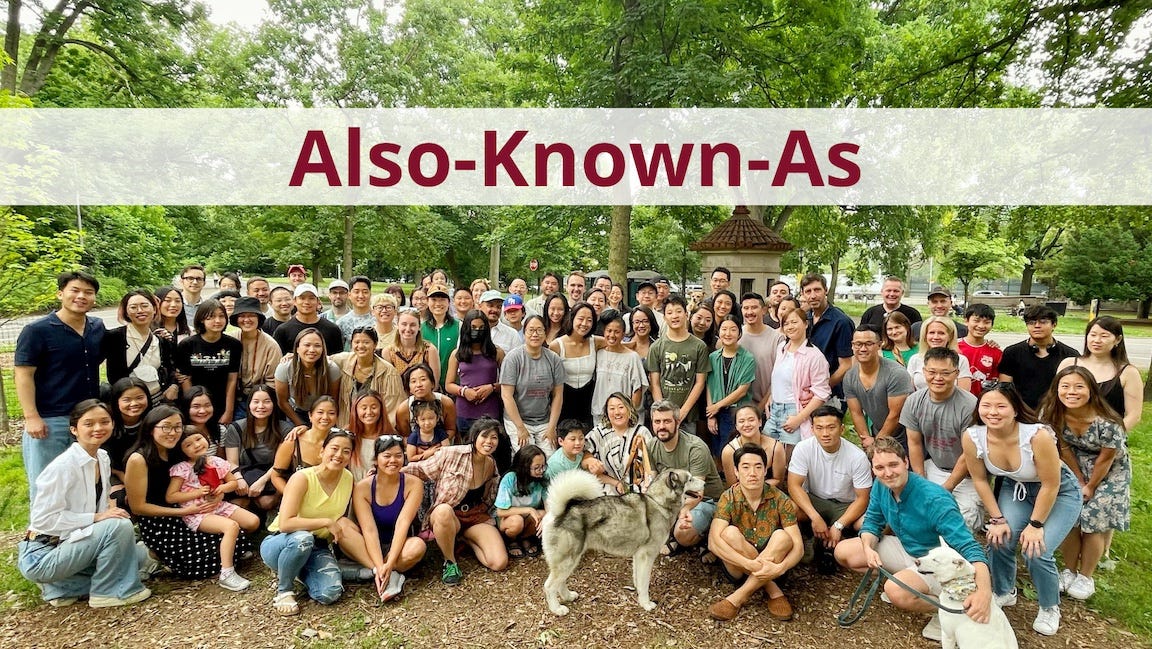Issue 17: Celebrating Children's Day with Hollee McGinnis
Wholeness and healing through connection with our ancestors.
Meeting Hollee for the first time felt like going home, especially as we both questioned the impacts of childhood and longing for belonging. Is home where you live now? Or where you grew up? Is it the homeland — your country of heritage or familial origin? Or where you feel most comfortable being yourself? We share a desire to piece back together the parts of ourselves that got fractured - by migration, adoption, sociopolitical conflict, or traumas of any kind. We don’t have to compare the ways in which life disrupts us, rather to honor and to heal them — in mind, body and spirit. We all deserve to be happy, whole and free - our greatest wish for our own children. Thank you Hollee, for sharing your wisdom and modeling ways in which we can be all three!
Flavor of the Week: KP Q&A with Hollee McGinnis
In addition to being adopted from South Korea, Hollee has more than 25 years of community organizing, practice, policy, and research experience relating to the life course of orphaned and separated children in alternative care — primarily focused on adoption and institutional care (orphanages). She is an expert on intercountry adoption, transracial adoption, racial/ ethnic and adoptive identity, child and adolescent mental health, parenting across difference, racial trauma, and adult adoptee mutual aid groups.
Hollee speaks regularly at national conferences and adoption/ child placing organizations. She has published numerous scholarly articles, book chapters, and essays; and has been sought out by the news media including New York Times Magazine, BBC News, and NPR. Hollee founded Also-Known-As in 1996, which is “the longest running adoptee-led organization for adoptee services in the United States.” She centers the lived experiences of adoptees, former foster youth and those in institutional care, in order to change child welfare practices and help those individuals heal from relationship and cultural losses incurred by child welfare systems. Follow Hollee on IG @hollee.mcginnis.
Introduce yourself more personally in 2-3 sentences.
My name is Hollee McGinnis. I'm also known as Lee Hwa Young – that is my Korean birth name. I was adopted from South Korea at the age of three and a half. Adoption, healing from the losses of relationships and culture, and learning to love across differences have been the motivating questions in my life and my career.
Where are you from?
Right now I live in Richmond, Virginia, but I grew up about an hour outside of New York City. So I will always consider myself a New Yorker.
No, where are you REALLY from? (Haha!)
Where am I really from? I am really from the universe. But my body was born in South Korea, and my heart and soul grew up in New York. And I think there's parts of my heart and soul that I have been retrieving from the life that I didn't get to live in Korea.
What’s your sign?
Scorpio sun, Virgo rising, and Pisces moon.
How would you describe yourself in five words?
Introspective. Fun. Charming. Intelligent. Compassionate.
What do you love about being Komerican?
That's a hard question, because being Komerican is a lot of friction [for me]. On the other hand, I've come to appreciate the friction caused by straddling worlds because it's been a source of my growth. It's been a source of me busting through conditioning and certain ways of thinking about how things are supposed to be — and how things actually are.
And of course, what are your favorite Korean foods?
I love anything that is kimchi-ed! And a part of my journey of reclamation and what I like to call re-indigenizing myself to the culture I was born into but I didn't grow up in – has been to make kimchi. I love making pogi, the whole napa cabbage kimchi. And I’ve gotten to a point where I make it for my family.
Now I'm offering classes to help other adoptees, the Korean diaspora, and anyone who has a heart, spirit or blood connection to Korean food – through a class called, “Healing with Our Ancestors: Kimchi Making.”
What was your childhood like and what has it taught you?
The inspiration of my life and my childhood growing up in a transracial family, is the dream that I think I am trying to dream into the world – which is that we can live and see someone across the world as daughter or son, or sister and brother.
The dark side of my childhood is that we as humanity are very far from that. And that simply loving harder won't change the way that we continue to live inside of difference, and the way we have in societies perpetuated and prevented ourselves from really actually being able to love unconditionally, and see each other as one human family.
Can you share something exciting that you’re working on now?
Well, my kimchi making classes are very much my excitement right now. It is a labor of love and I feel so gifted that I was able to do one of the first classes for the organization I started in New York for adult international adoptees called Also-Known-As, a couple of weeks ago.
But you know, excitement is also nerve-racking. I have a story that I want to write, and it's been percolating for a while. And I think it's feeling more and more ready to come out in form as a book.
What do people underestimate about you?
That I actually am more fierce than I appear.
Share your proudest moment in the past year.
I think my proudest moment over the past year has been having an experience of what I'll explain as an ego death — and navigating it within a weekend versus years and years or months and months.
What was your hardest moment in the past year?
It was that ego death.
We’ve all been hurt in some form or fashion. What are you healing from?
You know, I think for adoptees, we immediately point to our adoption, and it's not so much the adoption into the family that we grew up into, but it's the break or the trauma from the family that we had to get disrupted out of.
What I realized is that trauma, and the thing that I've been really healing from — is more of how that internalized within myself and broke me into many parts. And the journey of healing has really been to bring all those parts back into relationship, into wholeness. It's something that I've been working on actively since my 20s when I started a group for adult international adoptees, and one that I continue in my work as a professor of social work, and in my research.
How do you love yourself?
I try to pause. I try to rest. Those are things that I did not do until I was diagnosed with breast cancer in January of 2020. That caused a really deep soul searching about how I had been living my life — that possibly contributed to this disease growing in my body. And so I got really clear on the priorities of life, which is – if you're not here you can't worry about anything. This really, re-centered me being more loving and caring toward my body, which as an Asian woman, I've largely been conditioned to abuse and ignore.
How do you love others?
I have been actively working on developing practices that are anti-oppressive, so I enact them or I'm experimenting with them a lot in my classrooms and the way that I teach, rather than teaching in a way that gives me power over my students. I really intentionally think about how I can be with them and teach with my students. Rather than living in the either/or, living more in the both/and, in my relationships with others.
And I think the most important thing is just noticing where inside internally, I am oppressive and judging. Because I find that the more that I can begin to be self-loving and caring, I can actually be more of that with my relationships to others.
What five things can you not live without?
Kimchi. Korean food in all of its forms. Nature. Really heartfelt conversations and relationships.
What’s your favorite dance song?
Alright, when I was in college I loved that song, “This Beat is Technotronic.”
What’s your favorite kind of pie?
Cherry pie.
H Mart Happiness: What’s your favorite product and why?
“Yuja cha is my #1 because it is a uniquely Korean flavor and reminds me of my childhood - feeling cozy and cared for, especially when under the weather.” - Sabrina K.
What’s your favorite H Mart product? Leave a comment so we can feature it here on the webzine!
Crispy Crust: A Hint of Han - Subversive poetry that soothes
What Are You? What are you? A person. I mean, where are you from? Here. I mean, where were you born? Here. In Houston. What about you? Me, too. I mean, where are you REALLY from? Texas. America. Earth? I mean, are you Chinese? No. Are you? Of course not! I just thought you might be. Why? Umm, I was just asking. For the record, I’m Korean and have never even traveled outside the U.S. Well, you don’t have to freak out!!! I didn’t. I was answering your questions. But since you questioned me like a freak, shall I act like one now? ***
Love, Sarah
Korean School: Children’s Day 어린이날
Fun facts, idioms, translations and history
Children’s Day 어린이날 (uh-rin-i-nal) in Korea is a national holiday celebrated on May 5th every year. It is probably every child’s second favorite day of the year (next to their birthday), because it’s literally a holiday created for them when the family spends time together, makes a day trip together, and often buys a gift for children.
Children’s Day was first created in 1923, by Bang Jeong-hwan, who was an activist, educator, and children’s literature creator and publisher, who coined the term (or first widely spread the term) “어린이 uh-rin-i,” which literally translates to “young person,” that is now a common word to call children. Before he used the term, children were often just called a baby or even somewhat derogatory terms. Bang Jeong-hwan saw the importance of respecting young people and wanted to spread the term to educate people that children should be respected as independent human beings. Aside from this valuable history of Children's Day, it's a joyful holiday when people can take a day off during beautiful spring weather.
Sweet & Salty: A list of the tastiest treats satisfying all the senses
Get to know Also-Known-As, the nonprofit organization founded by today’s interviewee Hollee. Their mission is “to build a community that empowers the voices of adult international adoptees, while providing resources and space to acknowledge the loss of birth country, culture, language, and biological family.” They host many meaningful events as well as offer mentorship and scholarships for adoptees.
The succinct and moving poetry of yung pueblo has a way of piercing the heart and distilling the human experience in universal and lasting ways. When I am hurting, I turn to it for immediate reconnection to myself and to humanity. How gifted yung pueblo is at revealing hard truths without harshness and encouraging personal accountability to liberate ourselves from the challenges of life!
I cannot help but connect the spirit of Children’s Day to one of my favorite children’s books by Aram — Sunday Funday in Koreatown (Holiday House 2021). Yoomi encounters all sorts of challenges on Sunday, her favorite day to play! But she learns that overcoming her frustrations and the changes can welcome different experiences that bring newfound joy and and fun. You can find the book wherever books are sold, but support indie bookstores by shopping online at Bookshop.












